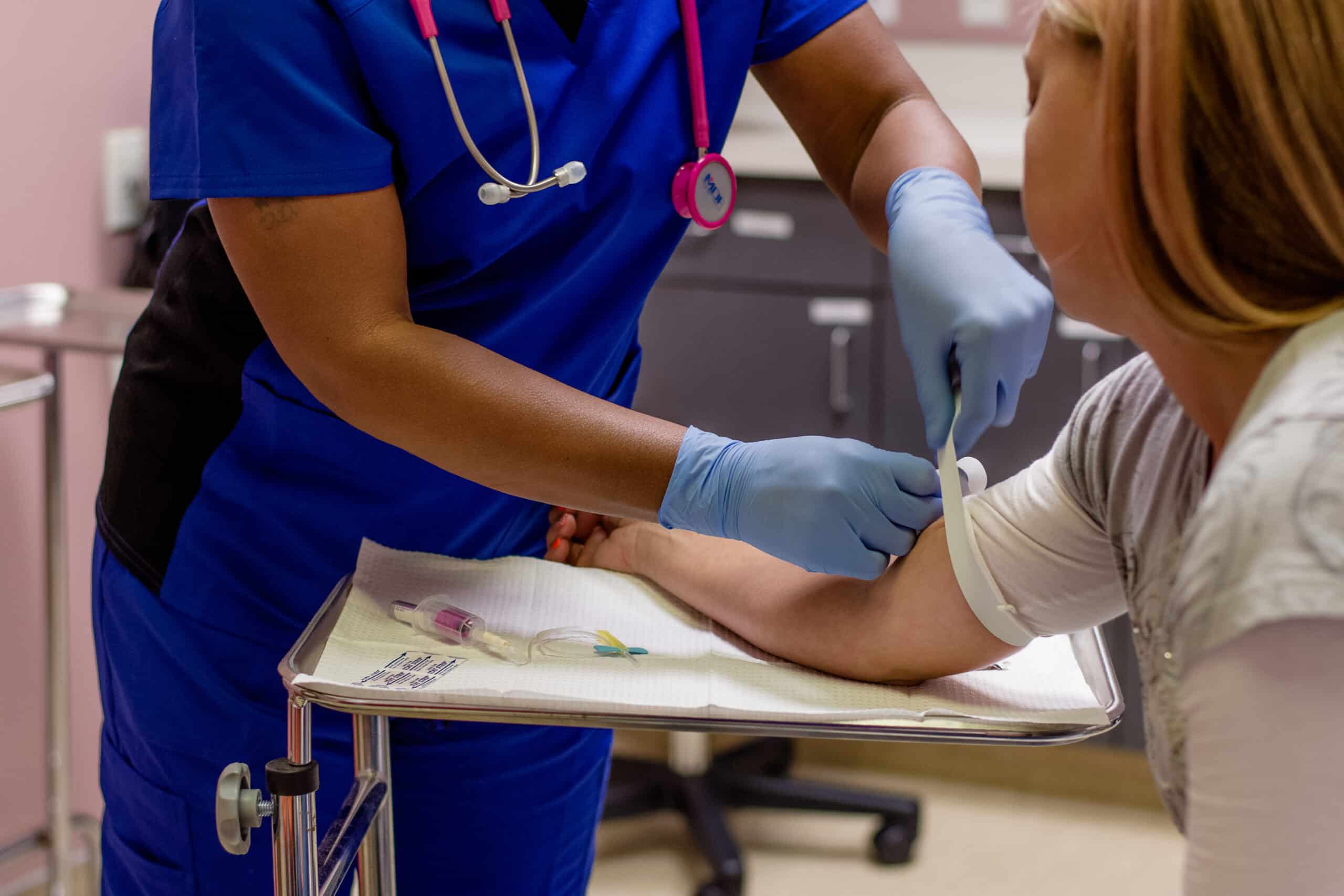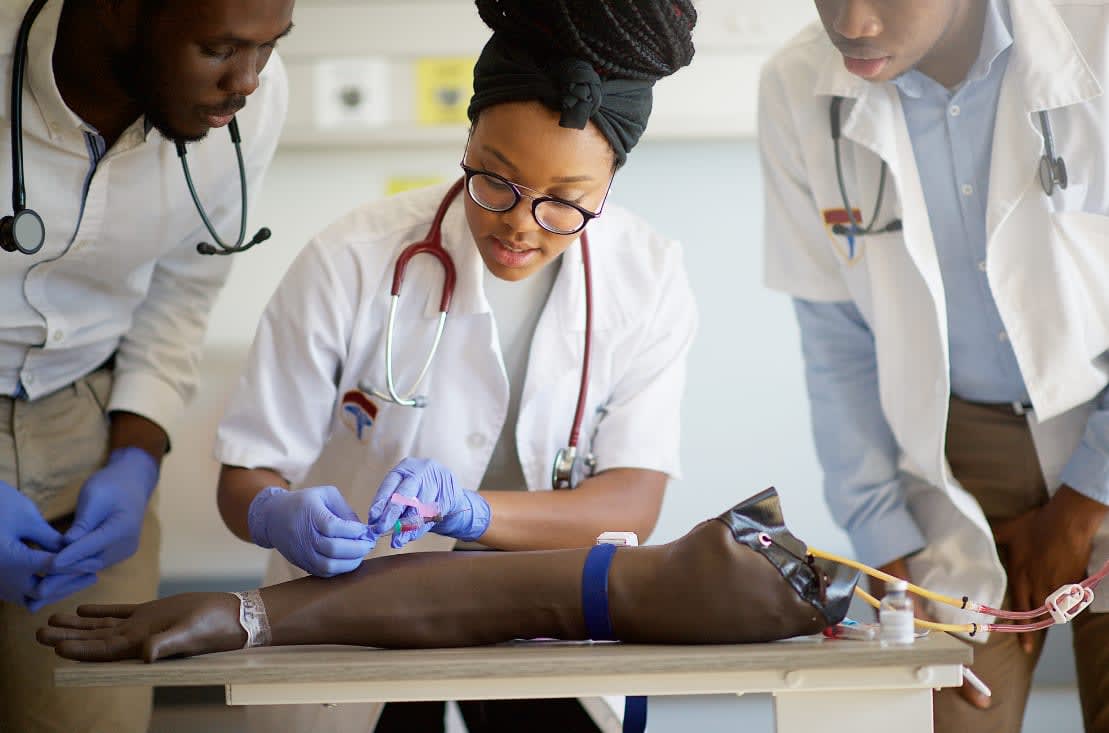Timeline Explained Everything About Completing a Phlebotomy Training Course
Timeline Explained Everything About Completing a Phlebotomy Training Course
Blog Article
The Course to Qualification: Recognizing the Phlebotomy Educating Training Course Trip and Its Value
As you take into consideration the path to accreditation in phlebotomy, it is essential to recognize the duty you'll play in healthcare. Your training will certainly cover vital skills, from blood collection methods to patient interaction. Each part of the program prepares you for the obstacles in advance. What specifically does the trip involve, and why is accreditation so important for your future occupation? Let's explore these concerns better.

The Function of Phlebotomists in Healthcare
Phlebotomists play a vital role in the medical care system, serving as the important web link between individuals and important analysis testing. You'll execute blood draws, ensuring examples are gathered properly and safely. Your expertise assists in diagnosing clinical conditions, checking health and wellness, and leading therapy decisions.
In your everyday communications, you'll need to develop trust with individuals, making them really feel comfortable during what may be a demanding experience. You are accountable for identifying and managing samples meticulously to avoid contamination or errors, which can affect test results.
Beyond this, you'll commonly function along with doctors and nurses, communicating important details concerning people' problems. By understanding your abilities, you add meaningfully to person treatment, making you an indispensable part of the clinical team.
Review of Phlebotomy Training Programs
When discovering phlebotomy training programs, you'll locate numerous kinds developed to fit different schedules and learning styles. Each program aids you create crucial skills like blood collection and client interaction. Recognizing these choices is essential to picking the appropriate course for your profession.
Kinds Of Training Programs
A number of kinds of training programs are available for those looking to end up being skilled in phlebotomy. Additionally, some healthcare facilities and clinics provide on-the-job training programs, offering sensible experience while you learn. Whatever path you pick, each program aims to furnish you with the needed abilities for a successful phlebotomy occupation.

Key Skills Established
Understanding phlebotomy calls for a collection of vital abilities that are created through complete training programs. You'll find out technological abilities like proper vein selection, needle insertion, and blood collection techniques. These hands-on methods ensure you can carry out procedures securely and effectively. In addition, interaction abilities are basic; you'll require to interact with individuals, explain treatments, and placed them comfortable. Comprehending composition and physiology is crucial, as well, as it assists you find veins and understand the body's response to blood attracts. Ultimately, you'll obtain understanding of security protocols and infection control, ensuring you preserve a sterilized environment. Each of these abilities is necessary for your success as a licensed phlebotomist, making you a useful property in any medical care setup.
Trick Elements of a Phlebotomy Program
In a phlebotomy course, you'll concentrate on important topics that lay the groundwork for your future career. You'll take part in hands-on training that permits you to apply what you have actually found out in real-world settings. Both the core curriculum and functional experience are vital for your success as a phlebotomist.
Core Educational Program Overview
While going after a phlebotomy training program, you'll encounter a core educational program made to equip you with essential abilities and expertise. Phlebotomy Classes Near Me. This curriculum commonly includes anatomy and physiology, concentrating on the blood circulation system and understanding blood components. You'll likewise find out about various types of blood collection methods, including venipuncture and capillary leak strategies
Additionally, infection control and safety protocols are important components, ensuring you recognize exactly how to preserve a sterilized atmosphere. You'll study patient communication, stressing communication and empathy, which are critical for reducing individual anxiousness.
Hands-On Training Experience
Getting hands-on experience is an important component of your phlebotomy training program. This functional training allows you to use what you have actually learned in a real-world setup, enhancing your abilities and confidence. You'll practice venipuncture strategies, discover how to take care of different types of samplings, and get aware of the devices used in the area. Under the assistance of skilled teachers, you'll improve your skills, guaranteeing you're gotten ready for any situation you could deal with.
In addition, you'll get the opportunity to communicate with patients, which is necessary for developing your communication abilities. This combination of technological effectiveness and interpersonal abilities is critical for your success as a licensed phlebotomist. Inevitably, hands-on training is where theory meets method, strengthening your knowledge and readiness for qualification.
Certification and Licensing Demands
Prior to you can begin your career in phlebotomy, it is crucial to recognize the certification and licensing requirements that differ by state. Many states call for phlebotomists to hold a certification from an acknowledged organization, such as the National Phlebotomy Organization or the American Culture for Clinical Pathology. These certifications usually entail passing a test that tests your knowledge and skills in the field.
In enhancement to certification, some states have particular licensing demands. You may require to finish a particular variety of hours in professional technique, send evidence of training, or undertake a history check. It is crucial to research your state's regulations to make sure you satisfy all needed criteria.
Remaining informed regarding these demands not only helps you secure a position but also enhances your trustworthiness as an expert. By meeting these requirements, you'll be well on your way to a successful job in phlebotomy.
Hands-On Training and Practical Experience
Hands-on training and sensible experience are important components of your phlebotomy education and learning, as they enable you to apply theoretical knowledge in real-world scenarios. Throughout your training, you'll engage in supervised venipuncture, find out appropriate methods, and become accustomed to different blood collection devices. This direct involvement is critical for constructing your self-confidence and developing your abilities.
You'll function closely with seasoned specialists who can guide you via the nuances of patient communication and example handling. Each technique session not only reinforces your understanding yet likewise prepares you for the busy atmosphere of healthcare setups.
Furthermore, many programs include scientific rotations, permitting you to experience varied settings, from medical facilities to outpatient clinics. This direct exposure helps you adjust to various difficulties and patient demands, guaranteeing you're well-prepared for your future role. Accept these chances, as they're important to coming to be an experienced and thoughtful phlebotomist.
Obstacles Encountered Throughout Training
While getting hands-on experience is essential, it's essential to acknowledge the obstacles that can arise during your phlebotomy training. Additionally, grasping the abilities needed for blood attracts takes technique; you might struggle with technique initially.
Time management can also be a difficulty, as harmonizing theory, useful sessions, and personal commitments can feel daunting. You might face differing finding out rates amongst your peers, leading to feelings of self-doubt if you assume you're falling back. Ultimately, adjusting to the various personalities of instructors can be tough, as each might have an unique teaching design.
Identifying Phlebotomy Classes Near Me these barriers beforehand can prepare you for success and assist you establish resilience throughout your training trip.
Job Opportunities After Qualification

As you acquire experience, you might also take into consideration focusing on locations like pediatric or geriatric phlebotomy, dealing with particular person requirements. Some phlebotomists pick to advance their jobs by becoming research laboratory specialists or seeking further education and learning in health care fields.
In addition, your accreditation can bring about roles in training or overseeing new phlebotomists, enabling you to share your expertise. With the healthcare market consistently growing, your skills will certainly constantly be in demand, leading the means for a stable and fulfilling occupation. Welcome the possibilities waiting for you!
Frequently Asked Concerns
What Is the Normal Period of a Phlebotomy Training Course?
Phlebotomy training courses commonly last around four to eight weeks. You'll take part in hands-on practice, classroom direction, and on-line learning. Completing this training prepares you for accreditation and a satisfying occupation in medical care.
Are Online Phlebotomy Courses Available?
Yes, on-line phlebotomy training courses are available. They provide adaptability and ease, allowing you to examine at your very own speed. Just validate the program is certified to fulfill qualification demands and get useful skills for your profession.
How Much Does Phlebotomy Training Usually Expense?
Phlebotomy training usually costs between $700 and $2,500, depending on the program and location. You need to take into consideration aspects like program length, included products, and hands-on experience when selecting the ideal training for you.
What Prevail Prerequisites for Phlebotomy Training?
Usual prerequisites for phlebotomy training frequently include a secondary school diploma or GED, booster shots, and a background check. Some programs might likewise call for fundamental healthcare knowledge or accreditations, ensuring you're planned for hands-on training.
Can I Work While Finishing My Phlebotomy Training?
Yes, you can work while completing your phlebotomy training. Lots of trainees equilibrium work with their researches, however ensure to handle your time effectively to assure you satisfy both job and training dedications efficiently.
Report this page